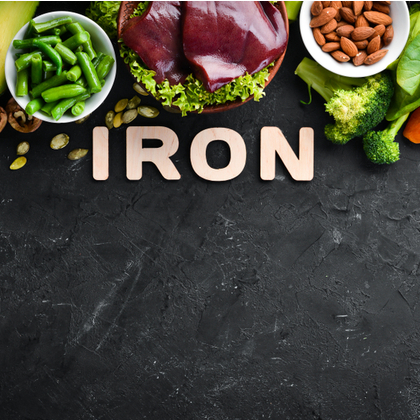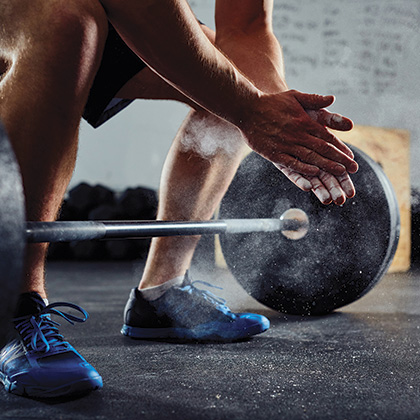There are several types of anaemia, the most common of which is caused by a deficiency of iron (around 500 million people worldwide are thought to have iron-deficiency anaemia (i)). But whatever the type, what causes anaemia is the same – that is, when you have fewer red blood cells than normal or less haemoglobin than normal in your red blood cells.
Red blood cells and haemoglobin are essential parts of blood because they are necessary to get oxygen from your lungs to all the other parts of your body. These cells are made in the bone marrow and millions are made to replace older cells each day (red blood cells live for about 120 days and are removed by the liver and the spleen). Haemoglobin, meanwhile, is a substance found in red blood cells that binds to oxygen (33 per cent of a red blood cell is made of haemoglobin).
If you have lower-than-normal levels of either red blood cells or haemoglobin, your body won’t get the oxygen it needs to work effectively. This can cause a number of symptoms, including the following:
-
Tiredness
-
Lack of energy
-
Breathlessness
-
Heart palpitations
-
Light-headedness
-
Pale skin
-
Headaches
-
Tinnitus (ringing in the ears)
-
Tingling fingers
What causes iron-deficiency anaemia?
Iron is an essential ingredient for healthy red blood cells and haemoglobin. There are several things that can lead to iron-deficiency anaemia, the most common in men and post-menopausal women being bleeding in the stomach and intestines caused by taking certain medicines, a stomach ulcer, stomach or bowel cancer (according to the British Society of Gastroenterology two to five per cent of adult men and postmenopausal women in the developed world have iron-deficiency anaemia (ii)).
Iron-deficiency anaemia can also be caused by what you eat (or, rather, what you don’t eat), with those who eat a poor or restricted diet thought to be at particular risk. Women who have heavy periods may also find iron-deficiency anaemia a problem. However, some health experts claim that if you have a healthy balanced diet, you should be getting all the iron you need.
While it may seldom be serious or cause long-term complications, having mild untreated iron-deficiency anaemia may lower your immune system and make you more susceptible to infections.
Severe anaemia, on the other hand, may affect your heart and lungs, leading you to develop an abnormally fast heartbeat (tachycardia) or even heart failure. Doctors also believe that some cases of restless legs syndrome may be caused by iron-deficiency anaemia ( iii) (RLS caused by iron-deficiency anaemia is referred to as secondary RLS).
If you have the symptoms of iron-deficiency anaemia, it’s important to consult your GP for a diagnosis and to rule out any underlying health issues. Thankfully, treating iron-deficiency anaemia is relatively simple, and if you’re diagnosed your GP may prescribe a course of iron tablets.
Other types of anaemia
Besides iron deficiency there are several other things that can cause anaemia. These include red blood cell problems such as sickle cell anaemia and thalassaemia, where the red blood cells are fragile and break in the bloodstream, as well as bone marrow problems and leukaemia (though these are rare causes of anaemia). Some other health conditions such as chronic kidney disease and rheumatoid arthritis can cause anaemia too.
More well known, however, is anaemia caused by a deficiency of vitamin 12 or folic acid. A deficiency in either of these nutrients leads to abnormally large red blood cells that cannot do their job effectively, which can lead to lower-than-normal oxygen levels in the body.
This type of deficiency is also more common in older people (according to the NHS it affects around one in 10 people aged 75 or older and one in 20 people aged 65 to 74 (iv)).
The symptoms of vitamin B12 or folate deficiency anaemia are similar to those of iron-deficiency anaemia, but also include depression and cognitive problems (specifically problems with memory, understanding and judgement).
What causes pernicious anaemia?
Pernicious anaemia is an autoimmune condition that can lead to vitamin B12 or folate deficiency (according to the National Institute of Health and Care Excellence – NICE – it’s the most common cause of B12 deficiency (v)). When your immune system attacks the cells in your stomach, it can stop your body from absorbing B12 and folic acid from the food you eat. According to the Pernicious Anaemia Society, the condition is often considered to be a disease that affects the elderly (vi). However a survey carried out by the society suggests it can be diagnosed at any age. It also claims pernicious anaemia is more prevalent in women than in men. Pernicious anaemia is also thought to run in families.
Meanwhile, the NHS claims a lack of vitamin B12 or folic acid in your diet may lead to deficiencies in either nutrient, but this isn’t particularly common (vii). People who follow a strict vegan diet are often thought to be at risk, but many vegans are aware of the fact they don’t have many sources of B12 in their diet, and take vitamin supplements to correct the deficiency.
Other things that may cause a vitamin B12 or folic acid deficiency include taking certain medicines that affect the body’s absorption of both nutrients, such as anticonvulsant medicines and proton pump inhibitors (PPIs), which are often used to treat indigestion. Conditions such as coeliac disease and Crohn’s disease can also prevent the body absorbing folic acid.
How is it treated?
As with iron-deficiency anaemia, treating vitamin B12 or foliate-deficiency anaemia is usually straightforward, and involves injections or tablets to replace the nutrient that you need more of. People with pernicious anaemia, for instance, usually need regular B12 injections for the rest of their lives (though after an initial period of building up their B12 levels, they only need the injections every three or six months).
If you have a folic acid deficiency, on the other hand, you may need to take folic acid tablets – usually for around four months.
Women and anaemia
Whereas the risk of many health conditions increases as you get older, women are more likely to have iron-deficiency anaemia when they are younger (that is, before the menopause). After the menopause, however, a woman’s risk of developing iron-deficiency anaemia is the same as that of a man’s.
The most common cause of iron-deficiency anaemia in younger women is heavy periods (menorrhagia). According to Women’s Health Concern – the patient arm of the British Menopause Society – one in 20 women see their GP every year about heavy periods, and in more than half of cases there is no medical reason why (viii). If you have heavy periods it may be a good idea to mention it to your GP, who can decide whether or not you need to be tested for anaemia.
According to NICE, 14 percent of non-pregnant women of childbearing age in the UK have iron deficiency anaemia, with two to five percent of postmenopausal women affected (ix), making iron is a common mineral deficiency in this country.
Anaemia in pregnancy
It’s also common for women to become anaemic when they’re pregnant (NICE says 23 percent of pregnant women are affected by iron deficiency anaemia), as many pregnant women are low in iron or folic acid.
Pregnant women need extra iron to make sure their baby is supplied with enough blood to give them plenty of oxygen and nutrients. A developing baby can also use up a mother’s reserves of folic acid, which can cause anaemia if she doesn’t get enough folic acid in her diet. Pregnant women who don’t get much vitamin B12 in their diet may also develop B12 deficiency anaemia.
Your risk of developing anaemia in pregnancy is also higher if you’re carrying more than one baby, if you have morning sickness that’s making you vomit frequently, if you’ve had two pregnancies close together or if you had anaemia before you were pregnant. For more advice on how to manage your health during pregnancy, see our guide.
Birth risks
Whatever the cause, anaemia during pregnancy can leave you feeling constantly tired and washed out. If left untreated it could also increase your risk of complications, including having a premature birth or developing depression after your baby’s born. You may also develop anaemia if you experienced a lot of blood loss during the birth itself.
Meanwhile a deficiency of folic acid in pregnancy could contribute to the development of birth defects such as neural tube abnormalities (spina bifida). This explains why women are advised to take a multivitamin containing 400-microgram folic acid supplement before conceiving and up until they are 12 weeks pregnant (x).
Eating to prevent anaemia
The most obvious way to prevent anaemia caused by a deficiency of iron, vitamin B12 or folic acid is to get more of one or more of these nutrients in your diet. If you’re diagnosed with anaemia, your GP may also advise you to add more foods that are high in the nutrient you’re deficient in to help build up your stores of that nutrient, in addition to taking oral supplements or having injections.
Iron-rich foods
A vital trace mineral, iron is found in two different forms: heme iron is found in meat, fish and poultry; non-heme iron is found in plant foods. Experts agree that non-heme iron isn’t as easily absorbed by the body as heme iron. But vitamin C can increase its absorption, which is why people who need more iron are often advised to drink a glass of orange juice or another juice drink with added vitamin C when they take their iron supplement (xi).
Foods are rich in iron include oysters, clams, mussels, liver, sardines and red meat, while vegetarian sources include fortified breakfast cereals, wheat bran, beans, lentils, nori seaweed, nuts, pumpkin seeds, eggs, dried apricots, blackstrap molasses and dark green leafy vegetables.
However, if you’re pregnant, it’s recommended that you avoid liver because it contains vitamin A, which may harm your baby.
Foods that contain copper may also be useful as copper helps improve iron absorption: copper-rich foods include cheese, egg yolks, seafood, liver, green vegetables and dried figs.
Vitamin B12 is important as it’s needed for the production of red blood cells, but it also plays a part in releasing energy from the food you eat and it helps the body to process folic acid.
It’s mostly found in animal foods such as meat, fish, eggs and dairy products. Vegans may have more difficulty getting B12 in their diets as there aren’t many non-animal and non-dairy sources. You can, however, get it from yeast extract spreads (such as Marmite) and from fortified foods such as breakfast cereals and soya products.
Folic acid foods
Folic acid – also a B vitamin – works with vitamin B12 to make healthy red blood cells.
Folic acid is found in a wider variety of foods than B12, including plant foods such as broccoli, Brussels sprouts, asparagus, peas, chickpeas, brown rice, leafy green vegetables, citrus fruits and juices and fortified foods.
Liver, kidneys and yeast and beef extracts are also good sources of folic acid, but again it’s important to avoid eating liver if you’re pregnant. Moderate amounts are also found in cheese, nuts, yoghurt, potatoes, oats, bread, salmon and beef.
Importantly, try to avoid overcooking foods containing folic acid, as it can lead to depleted levels of the vitamin (steam, stir fry or microwave vegetables to help them retain as much folic acid as possible).
Natural remedies for anaemia
Since the most common causes of anaemia are caused by nutritional deficiencies, it goes without saying that taking supplements of the nutrient or nutrients in question – that is, iron, vitamin B12 or folic acid – can help resolve the deficiency. Those who have been identified as at risk of developing anaemia may also help prevent it by taking the relevant nutritional supplements if advised to do so by a health professional.
Iron
Supplements are routinely used by GPs to treat diagnosed cases of anaemia caused by iron deficiency and are widely available without prescription. However, it’s worth noting that some forms of iron can cause stomach upsets, including constipation. This makes the case for choosing a form of iron that’s easy on the stomach in a supplement, such as iron citrate. Iron is also often included in decent levels in good-quality multivitamin and mineral supplements.
Vitamin C
Anaemia isn’t caused by a deficiency of vitamin C, but if you take an iron supplement, combining it with vitamin C may help your body absorb it. There are two reasons why vitamin C is thought to work in this way: it prevents the formation of insoluble and non-absorbable iron compounds, and it reduces ferric to ferrous iron, which may be a requirement for the absorption of iron into the cells within the mucous membranes (xii).
Vitamin B12/folic acid
If you’re diagnosed with vitamin B12 or folic acid deficiency anaemia, your GP may give you tablets or injections to replace one or other nutrient. Both are also widely available in supplement form without prescription, and can usually be found in good-quality multivitamin and mineral supplements.
Anaemia and iron deficiency can make you feel thoroughly washed out, but this guide outlines the simple steps you can take to tackle it and feel better. To discover more articles and advice on how to support your overall health, visit our dedicated hub.
References:
-
Available online: https://cks.nice.org.uk/anaemia-iron-deficiency#!backgroundSub:2
-
Available online: https://www.bsg.org.uk/resource/guidelines-for-the-management-of-iron-deficiency-anaemia.html
-
Available online: https://www.nhs.uk/conditions/restless-legs-syndrome/causes/
-
Available online: https://www.nhsinform.scot/illnesses-and-conditions/nutritional/vitamin-b12-or-folate-deficiency-anaemia
-
Available online: https://cks.nice.org.uk/anaemia-b12-and-folate-deficiency#!backgroundSub:2
-
Available online: https://pernicious-anaemia-society.org/who-is-most-at-risk/
-
Available online: https://www.nhs.uk/conditions/vitamin-b12-or-folate-deficiency-anaemia/
-
Available online: https://www.womens-health-concern.org/help-and-advice/factsheets/heavy-periods/
-
Available online: https://cks.nice.org.uk/anaemia-iron-deficiency#!backgroundSub:2
-
Available online: https://www.nhs.uk/common-health-questions/pregnancy/why-do-i-need-folic-acid-in-pregnancy/
-
Available online: https://www.ouh.nhs.uk/patient-guide/leaflets/files/11903Piron.pdf
-
Hallberg. L, Brune. M, Rossander. L. The role of vitamin C in iron absorption.Int J Vitam Nutr Res Suppl. 1989;30:103-8.
Related Posts
Disclaimer: The information presented by Nature's Best is for informational purposes only. It is based on scientific studies (human, animal, or in vitro), clinical experience, or traditional usage as cited in each article. The results reported may not necessarily occur in all individuals. Self-treatment is not recommended for life-threatening conditions that require medical treatment under a doctor's care. For many of the conditions discussed, treatment with prescription or over the counter medication is also available. Consult your doctor, practitioner, and/or pharmacist for any health problem and before using any supplements or before making any changes in prescribed medications.

Christine
Christine Morgan has been a freelance health and wellbeing journalist for almost 20 years, having written for numerous publications including the Daily Mirror, S Magazine, Top Sante, Healthy, Woman & Home, Zest, Allergy, Healthy Times and Pregnancy & Birth; she has also edited several titles such as Women’ Health, Shine’s Real Health & Beauty and All About Health.
View More



